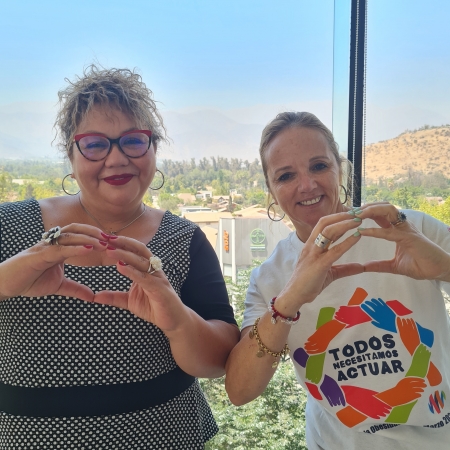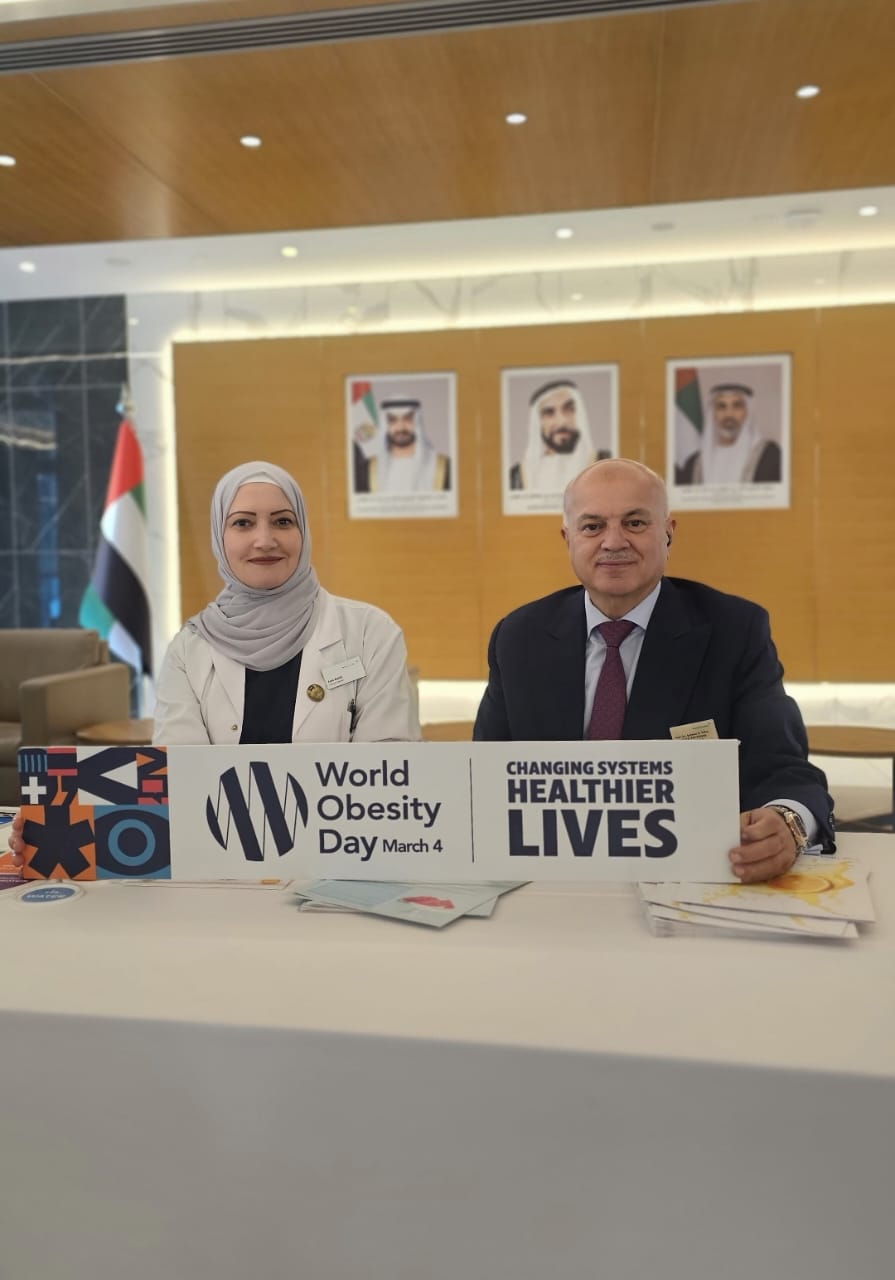القصص

مناقشة وصمة العار الوزن في شيلي
تتحدث الدكتورة آدا كويفاس من مركز Centro Avanzado de Medicina Metabólica y Nutrición (Cammyn) في تشيلي إلى ميلينا عن تجربتها في التعايش مع السمنة ومواجهة وصمة الوزن. شاهد المقابلة أدناه (باللغة الإسبانية).
النص (باللغة الإنجليزية)
د. كويفاس مرحباً ميلينا
ميلينا: مرحباً عزيزتي آدا
د. آدا كويفاس بادئ ذي بدء، أود أن أشكركم على موافقتكم على المشاركة في هذا اليوم العالمي الهام؛ اليوم العالمي للسمنة. نحن نسعى جاهدين للاعتراف بالسمنة كمرض وأن المرضى الذين يعانون من السمنة يحظون بالاحترام.
ميلينا: أنا ممتنة للغاية ويشرفني أن تتم دعوتي. يسعدني أن أتمكن من مشاركة تجربتي الشخصية وكيفية تعايشي مع الوزن الزائد، وآمل أن يساعد ذلك الآخرين.
د. كويفاس بالطبع، شكراً جزيلاً لك. يتم الاحتفال باليوم العالمي للسمنة في جميع أنحاء العالم، ويعمل الاتحاد العالمي للسمنة جاهداً من أجل هذا اليوم. لذا، ستكون جزءًا من حملة الاتحاد العالمي للسمنة هذه!
دكتور كويفاس: أخبريني يا ميلينا، في أي عمر بدأتِ تواجهين مشاكل مع زيادة الوزن أو السمنة؟
ميلينا: منذ سن مبكرة جدًا، وفي سن المراهقة كان وزني قد زاد بضعة كيلوغرامات، وبعد أن أصبحت أمًا زاد وزني دون أن أدرك ذلك. بدأت أعاني من مشاكل مثل الاكتئاب ومشاكل عاطفية أخرى مما أدى إلى وصول وزني إلى 120 كيلوغراماً.
د. كويفاس: ما تقوله مهم جداً، لأن الناس في كثير من الأحيان - وللأسف بعض المتخصصين في الرعاية الصحية - يلقون اللوم على أن الشخص "يأكل كثيراً" أو "كسول [و] لا يتحرك". من الجيد أنك ذكرت تلك الجوانب الأخرى التي لا يعرفها الناس كأسباب للسمنة.
ميلينا: كثير من الناس يميزون ضدنا، معتقدين أن الشيء الوحيد الذي نحب القيام به هو الأكل وتناول الطعام. في الواقع، الأكل مثل المخدرات، ونحن مدمنون على الأكل. ولكن هناك سبب يجعلنا نأكل.
دكتور كويفاس نعم، هناك سبب...
ميلينا: نحن نأكل لأحزاننا وأفراحنا وسعادتنا أو أي عاطفة لدينا، ننظمها بالطعام. عندما ندعو عائلتنا، نستقبلهم بمائدة مليئة بالطعام. عندما نكون حزينين في عزاء، علينا أيضًا أن نتناول الطعام. لذا، نحن نأكل من أجل مشاعرنا، وللأسف، ليس لدينا إمكانية الوصول إلى علماء النفس. في كثير من الأحيان، لا نعرف كيف نتصرف وهذا ما يجعلنا نكتسب هذا الوزن.
د. كويفاس Exactly, deep down it is also important to know that these emotions, for example, sorrow, generate the release of certain hormones in the brain that cause these thoughts of wanting to look for something to calm you down, just as you say, like a drug that calms those emotions of anguish, fear, sorrow, etc. Very clear as you say.
د. كويفاس: هل تعتقدين أن هناك تمييزاً ضد الناس؟ كيف أثر ذلك عليك في العمل أو في الجوانب العاطفية أو مع شريك حياتك؟
ميلينا: انظري، الكيلوغرامات الزائدة تقتلكِ جسديًا، لكن المجتمع يقتلكِ قبل أن تصلي إلى هذه النقطة، لأنه يغلق أبواب العمل معتقدًا أن امتلاكك وزنًا زائدًا يعني أنك غبية، وأننا لا نستطيع فهم شيء أو ممارسة وظيفة أو مهنة لمجرد أننا نمتلك وزنًا زائدًا. هذا في مكان العمل. الآن في المجتمع، في الحافلة، عليك أن تدفع تذاكر مضاعفة؛ في الحافلة عندما تجلس، لا يريد الناس الجلوس بجانبك. نحن أضحوكة الجميع، وعلى الجميع أن يضحكوا علينا. مثال آخر هو عندما يدخل شخص كبير الحجم (أفضل أن أقول شخص ضخم الحجم وليس بدينًا أو سمينًا)، يتوقع الناس أن يظهروا مرتديًا صندلًا وملابس فضفاضة، ويصدمون عندما تظهر أنت مرتديًا تنورة قصيرة وملابس ذات كعب عالٍ. ولماذا؟ لأن "المرأة البدينة" يجب أن ترتدي طريقة معينة في نظرهم. يبدأ المجتمع في إبعادك عنكِ وتحطيمك ببطء. هذا الاكتئاب يعني أننا في نهاية المطاف ننغلق في غرفنا وبيوتنا ولا نخرج. وهذا ناتج عن الطريقة التي يعاملنا بها المجتمع. علينا أن نكون أكثر تعاطفًا، ولكن ليس بطريقة متعالية حيث نقول: "انظروا إلى هذا المسكين"، لأن كوننا كبارًا لا يعني أن نكون فقراء، كوننا كبارًا يعني أن يكون لدينا عقل كبير أيضًا.
دكتور كويفاس لا يصدق، يا لها من مصادفة! قد لا تعلمون ولكن هناك دراسة منشورة من بلد آخر حيث سُئل أخصائيو الصحة الذين يتدربون على السمنة عن خصائص الأشخاص الذين يعانون من السمنة مقارنةً بالأشخاص النحيفين، ومن الواضح أنهم قالوا أن المصابين بالسمنة أغبى وأكثر كسلاً. لفت انتباهي أن الأشخاص الذين يعانون من السمنة قد يعتبرون أغبياء: عادة ما يسمع المرء أنهم كسالى، لكن أغبياء؟
وفيما يتعلق بتذكرة الطيران المزدوجة التي طُلب من الأشخاص الذين يعانون من السمنة المفرطة دفعها منذ بضع سنوات، لحسن الحظ أن هذا الأمر محظور الآن. ولكن من الواضح أن المشكلة لا تزال قائمة في سيارات الأجرة المشتركة (على الأقل في شيلي). في المدارس، كانت هناك أيضًا دراسة في الولايات المتحدة الأمريكية حيث تم إعطاء الأطفال صورًا لمن يرغبون أن يكون صديقهم - طفل يعاني من مشكلة السمنة أو طفل بوزن طبيعي - وكانوا دائمًا ما يختارون الطفل ذو الوزن الطبيعي ليلعبوا معه ويصبح أفضل صديق لهم. إذن، إنها مشكلة تنبع من الطفولة.
ميلينا: إنه شيء يخبرنا به المجتمع؛ فنحن نرى الإعلانات التجارية، والبرامج التلفزيونية، [و] هناك دائمًا امرأة نحيفة، ورجل وسيم نحيف، تلك هي النماذج التي يجب اتباعها. اليوم أريد أن أكسر ذلك؛ لهذا السبب ألقي محاضرات مع وزني الزائد - أنا لديّ مجتمعي بأكمله منظم وهذا لا يجعلني أكثر أو أقل غباءً. إنه يجعلني على قدم المساواة مع الجميع.
د. كويفاس على العكس، هذا يجعلك ذكية ومبتكرة للغاية. سيكون من الجيد أن تخبرنا قليلاً عن ذلك البرنامج المهم الذي طورته في مجتمعك لمساعدة الناس، لأنه من الغريب وللأسف في بلدنا أن السمنة منتشرة جداً في المناطق الأكثر ضعفاً. فالأشخاص الأقل دخلاً هم أكثر من يعانون من السمنة.
ميلينا: في هذه المجتمعات، لا يمكننا الحصول على الأدوية؛ فهي نادرة جدًا. في حي "باخوس دي مينا"، وهو الحي الذي أسكن فيه، يبلغ عدد سكاننا 180,000 نسمة في ثلاثة كيلومترات مربعة. لدينا عيادتان للمرضى الخارجيين وفي كل منهما يوجد طبيبان نفسيان. تقتصر الرعاية النفسية في بعض الأحيان على تلقي بعض الأدوية لعدة سنوات فقط. كما أن الحالات المرضية مثل السكري وارتفاع ضغط الدم وغيرها يتم علاجها ببعض الأدوية فقط مثل الميتفورمين أو الجليبنكلاميد أو غيرها. لكنها لا تعالج أصل المشكلة، وهي السمنة. إذاً، ماذا يفعل الأطباء؟ إنهم يعطونني حبوبًا لمرض السكري، لكنهم لا يعالجونني من السمنة التي يمكن أن تؤدي إلى العديد من الأمراض الأخرى.
د. كويفاس بالطبع، تؤدي السمنة إلى مئات الأمراض مثل بعض أنواع السرطان، وأمراض الكلى، والأمراض العصبية، واحتشاء عضلة القلب، وقائمة الأمراض تطول. لذا، كما تقول، علينا أن نكافح حتى يتم التعامل مع المشكلة من جذورها.
ميلينا: لهذا السبب نريد اعتبار السمنة مرضًا وإدراجها في "GES" (نظام الصحة العامة التشيلي) حتى نتمكن من الحصول على العلاج.
د. كويفاس: لحسن الحظ، تجري الأمور في جميع أنحاء العالم. فالشركات الكبرى تستخدم عارضات أزياء من غير العارضات التقليديات ناقصات الوزن. نأمل أن ينتشر هذا الاتجاه في كل مكان وفي بلدنا.
ميلينا: يرى الكثير من الناس أن هذه حرب بين الأشخاص النحيفين والأشخاص الكبار! ولكن يجب أن يعكس الوضع الواقع. كلنا نود أن نكون نحيفين وغير مثقلين بأي مرض، ولكن هذا هو واقعنا. يجب أن يكون لدينا تمثيل للواقع.
د. كويفاس: بالضبط، ونحتاج أيضًا إلى أن يحصل الأشخاص الذين يعانون من هذه المشاكل على العلاج وأن يساعدهم أخصائيو السمنة. هناك العديد من التجارب السيئة [عندما] تذهب إلى الطبيب ولا يعطيك العلاج المناسب. لا أعلم إن كان هذا قد حدث لك؟
ميلينا: لقد حدث معي مرات عديدة حيث يقولون لي أن الحل لمشكلة السمنة هو "أغلق فمك". الأمر سهل بالنسبة لهم. من السهل أن تقول لمدمن الكحول أن يتوقف عن الشرب، أو مدمن المخدرات أن يقلع عن المخدرات. عليك أن تفهم أنه، كما قلت لك في البداية، نحن ننظم كل مشاعرنا بالطعام [و] لو كان الأمر بهذه السهولة لما كان لدينا هذا الوزن. ليس من السهل أن نعيش هكذا، لديّ شخصان تقريبًا في جسدي وابنتي لديها ثلاثة أشخاص. انظري إلى التمييز: ابنتي تريد التبني وخاضت عملية كاملة لتبني طفل في المرة الأخيرة، لكن مؤسسة التبني أخبرتها أنها لا تستطيع التبني لأنها "بدينة"، وربما لهذا السبب لن تكون أمًا جيدة. لن تحب ابنك لأنها تعاني من السمنة؟ لن تعتني بالطفل لأنها "بدينة"؟
وبعبارة أخرى، لن أكون قادرة على أن أكون جدة لأنني بدينة؟ إن هذا التمييز الذي يمارسه المجتمع هو الذي يستمر في إبعادنا. صدقيني، ذلك الطفل الذي في مؤسسة لن يهتم بأن والدته تعاني من السمنة. إنه يريدها أن تحبه وأن تعتني به. حتى في رغبتنا في أن نصبح أمهات نتعرض للتمييز.
د. كويفاس بالطبع، يا لها من صدمة.
إن تجربتك وتجربة ابنتك قوية جداً، ونأمل أن تساعدنا هذه الرسالة التي تقدمينها وأن تساعدنا هذه الحملة على إحداث تغيير حتى لا تعيش ابنتك تجربة سيئة مرة أخرى.
ميلينا: وألا يمر أحد بهذا الأمر مرة أخرى. أشكرك يا آدا، لأنه يجب أن نجعل هذا الأمر أكثر علانية [و] أن ننشئ شبكات. كثير من الناس محبوسون في بيوتهم ويحتاجون إلى كلمة تشجيع، وصورة، وأن يقولوا: "إذا كانوا يستطيعون ذلك، فلماذا لا أستطيع أنا"؟ "لماذا لا أستطيع أن أظهر نفسي؟" صدقوني، كلنا نود أن نغمض أعيننا ونفتحها ونكون نحيفين، [لنكون] قادرين على التقاط الأشياء بسهولة، والتحرك بسهولة. لكن ما ندعوك اليوم هو أن تغمض عينيك وتفتحهما مرة أخرى وتقول: "هذا هو أنا، وأنا أحب نفسي كما أنا". اخرجوا إلى الشارع، امشوا، ابدأوا بالتعرف على بعضكم البعض، تحدثوا مع الآخرين. في كثير من الأحيان، لا يمكننا الوصول بسهولة إلى أخصائيي الرعاية الصحية، ولكن لدينا أصدقائنا وجيراننا الذين يمكنهم دعمنا في مشاعرنا. شكراً جزيلاً لك على هذه الدعوة، صدقني، ستفيد الكثير من الناس كثيراً.
د. آدا شكراً جزيلاً لكِ يا د. ميلينا وتهانينا.
بالتعاون مع





